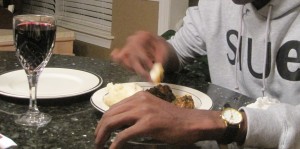 This is the first part of the tale of my visit to the State of Maryland, where food engaged me in a contest of wills and I almost ran for cover.
This is the first part of the tale of my visit to the State of Maryland, where food engaged me in a contest of wills and I almost ran for cover.
I had gone to the house of Nigerian writer and literary critic Ikhide Ikheloa to spend the night. I had never met him before until then, and as he reminded me over a bottle of Malbec red wine from Argentina (which I actually miraculously finished, for the first time in one sitting), the first contact we had was when I had sent him an electronic copy of my first collection of poems around 2006 and sought his opinion on them. We had had a few e-conversations on it and then I’d quickly moved on, first because I myself had lost faith and interest in that book because of it’s poor production, the publisher’s nonchalance, and generally because of my own general disgust with most of the poems in there that reflect the best and worst of my writing development. I could say this though: it had a very good cover design, made by a friend in Germany, and some very nice poems that I wrote in the university, even if I say so myself. So going to his house was mostly a step of faith, a belief in the power of good. Even he quipped that his American friends at the office had looked at him funny when he told them that he was about to host somebody in his house who he had met on the internet, and who was a young man. Something about that just didn’t sound right for those friends of his who may have heard words like “pedophilia”, “criminals”, “internet scam”, “serial killers” very many times before in American news broadcasts.
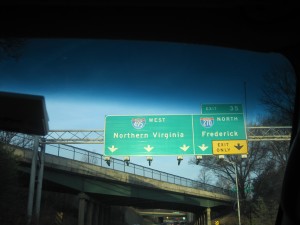 But we made it to his house in one piece, Vera Ezimora and I, with the aid of a talking GPS device. I have never been so humbled by the power of technology, where a little device as small as a mobile phone can lead a car driver to a location of more than an hour away, and where we had both never been before. We were coming from her University where we had gone to participate in one of her class tutorial sessions. (Needless to say, after that almost boring hour of listening to different accents of her classmates discussing the varying definitions and types of empathy, I am now convinced that I am never going to see that word in the same way ever again. Ever. And this is not a good thing!) No matter where anyone lives in the United States, a GPS device can lead anyone else there, without fail. It’s takes just a little imagination to conceive of how much of a leap we would achieve in Nigeria and Africa in general (in criminal investigation, business or even social relations) if we could just get adequate electronic mapping of the landscape.
But we made it to his house in one piece, Vera Ezimora and I, with the aid of a talking GPS device. I have never been so humbled by the power of technology, where a little device as small as a mobile phone can lead a car driver to a location of more than an hour away, and where we had both never been before. We were coming from her University where we had gone to participate in one of her class tutorial sessions. (Needless to say, after that almost boring hour of listening to different accents of her classmates discussing the varying definitions and types of empathy, I am now convinced that I am never going to see that word in the same way ever again. Ever. And this is not a good thing!) No matter where anyone lives in the United States, a GPS device can lead anyone else there, without fail. It’s takes just a little imagination to conceive of how much of a leap we would achieve in Nigeria and Africa in general (in criminal investigation, business or even social relations) if we could just get adequate electronic mapping of the landscape.
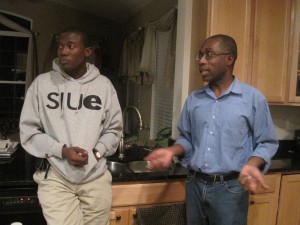 The man Ikhide Ikheloa who met us at the door turned out to be a simple, likeable man just like I had assumed from a distance. He was warm, and down to earth. He is a simple man with a very good taste, and humour; a family man in his middle age. A photo of Barack Obama rests beneath the television in the living room. He ushered us in with his still authentic Nigerian Pidgin English, and I felt immediately at home. His last visit to the country of his birth was just last September, and our first conversations dwelt on the impact that had on him. They were enormous, it seemed, and we listened to his tale of bad roads, generator fumes, LASTMA harassments, malaria, roadside vendors, friendships and many other highlights of his trip. Born and raised by a military policeman, he is no stranger to discipline. The tales he told during the few road trips he and I later made around town were of the memories of his childhood in the old Midwestern Nigeria, especially before, during and after the civil war where he had to survive alone with his brother as a young boy without any parent in sight. He is an avid reader. He also considers himself a compulsive writer, who just can’t help himself. On his critical reviews he says: “I’m a consumer of literature,” and I consider my critical opinion on the work I read as being within my rights of response to what I have spent my money and my time to consume.
The man Ikhide Ikheloa who met us at the door turned out to be a simple, likeable man just like I had assumed from a distance. He was warm, and down to earth. He is a simple man with a very good taste, and humour; a family man in his middle age. A photo of Barack Obama rests beneath the television in the living room. He ushered us in with his still authentic Nigerian Pidgin English, and I felt immediately at home. His last visit to the country of his birth was just last September, and our first conversations dwelt on the impact that had on him. They were enormous, it seemed, and we listened to his tale of bad roads, generator fumes, LASTMA harassments, malaria, roadside vendors, friendships and many other highlights of his trip. Born and raised by a military policeman, he is no stranger to discipline. The tales he told during the few road trips he and I later made around town were of the memories of his childhood in the old Midwestern Nigeria, especially before, during and after the civil war where he had to survive alone with his brother as a young boy without any parent in sight. He is an avid reader. He also considers himself a compulsive writer, who just can’t help himself. On his critical reviews he says: “I’m a consumer of literature,” and I consider my critical opinion on the work I read as being within my rights of response to what I have spent my money and my time to consume.
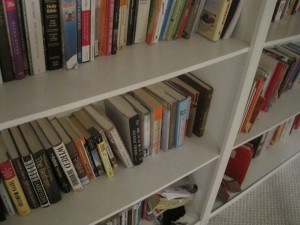
There was always nostalgia when he talked about his father who is now an old man living in Nigeria but who has visited him in the States. I listened to tales of countless encounters of his growing up with his father’s both hard and tender loving side while comparing it to his own fatherhood with two very young boys. There are too many differences, we agreed. Kids nowadays have it good, he said. We shared a mutual love for songs from the past: Rex Lawson, Ebenezer Obey, Victor Uwaifo, Fela Kuti, Victor Olaiya and so on, and he showed me his library of books, most of them filled with jottings and notes. He also gave me about six of them, especially those he had bought more than once. He has lived in the United States since 1982 when, on a whim, he packed his bags and left Nigeria which was at that time of a much stronger economy and currency that even the United States of America. These days, in Nigeria and on the internet, he’s known mostly as a literary critic, even though archives of NigeriansinAmerica.com has hordes of his popular and thought-provoking articles many of which have little to do with just book reviews, but general and very humourous outlook on life. He told me he doesn’t like the typecasting, and I agree. He’s foremost a writer, then maybe a critic. People interested in reading him should check out his writings online. He tells me that he hopes to return to on retirement at age sixty to a beautiful Nigerian countryside, reaping the benefits of his years of labour on the American continent.

The side of him that is not always obvious to the world however is his cooking skills. To put it mildly, he made the best pounded yam which we ate almost to stupor. I don’t know how many of you Nigerian men still know how to manage the kitchen while your wives went to work. You might want to take a lesson from this renaissance man who is also on Twitter and Facebook in keeping with the current trends in technology, though he doesn’t think that he’s cut out for the life of technology. I met his wife later in the evening, who turned out to be a lovely beautiful woman that we’ve sometimes read about in some of his articles. Oh, before I forget, I also met his daughters Ese, andthe world-famous Ominira both of whom had initially hidden in the safety of their first floor rooms as soon as our car parked outside while they peeped stealthily through the window upstairs just in case we turned out to be two hired guns sent from the surviving cells of the Nigerian military junta against whom their father worked while being a voice on the Pyrate Radio Kudirat which was set up during the Abacha Regime by Pro Democracy groups abroad to sabotage that brutal and oppressive Nigerian military government…
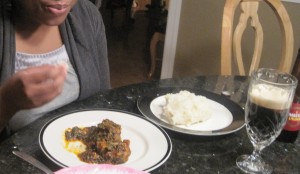 Again, I should say that he did make the pounded yam himself, and it was very good, but Vera and I have never agreed on whether the accompanying vegetable soup and sauce (which included snails, cow legs, and different delicious meats and fish) were also similar results of his culinary skills. I don’t doubt it. He is not a typical Nigerian man by many standards, and he’s surely not a lazy man. However, the voices of opposition and skepticism abound to drown mine of hope and solidarity. The loudest of them ironically belongs to his own first daughter who, having overheard our confused wonder at the dinner table about who made such a delicious soup, had asked aloud without providing a corresponding answer to clear the air of any further speculation: “Is that what he told you, that he made the soup by himself? Ha!” And just as soon as I completed one plate of food, it was replaced by another with the words. “K, here. Have and eat these too. They’re very good, and there’s more where they came from.” By the time I updated my Facebook status some minute later, it read: “KT is not drunk, but this drink of bottle will not wine itself…“. I however survived it by some miracle, but almost couldn’t get up on time the next morning to catch my flight. But in all, it was a memorable experience of a visit for many reasons. Not only because it was a day that I engaged food in a battle of wills, and I was almost roundly defeated.
Again, I should say that he did make the pounded yam himself, and it was very good, but Vera and I have never agreed on whether the accompanying vegetable soup and sauce (which included snails, cow legs, and different delicious meats and fish) were also similar results of his culinary skills. I don’t doubt it. He is not a typical Nigerian man by many standards, and he’s surely not a lazy man. However, the voices of opposition and skepticism abound to drown mine of hope and solidarity. The loudest of them ironically belongs to his own first daughter who, having overheard our confused wonder at the dinner table about who made such a delicious soup, had asked aloud without providing a corresponding answer to clear the air of any further speculation: “Is that what he told you, that he made the soup by himself? Ha!” And just as soon as I completed one plate of food, it was replaced by another with the words. “K, here. Have and eat these too. They’re very good, and there’s more where they came from.” By the time I updated my Facebook status some minute later, it read: “KT is not drunk, but this drink of bottle will not wine itself…“. I however survived it by some miracle, but almost couldn’t get up on time the next morning to catch my flight. But in all, it was a memorable experience of a visit for many reasons. Not only because it was a day that I engaged food in a battle of wills, and I was almost roundly defeated.
As for whether he cooked the soup that we ate, my hands are tied, so I would reserve my judgement until the next time. There will be a next time surely, be it in the folds of our American forest along with bottles of Merlot, or in the open spaces of our Nigerian wilderness along with gourds of frothy palm wine. We would surely do this again. And when that time comes, maybe I would be cooking the soups by myself. I would only hope that I am able to meet up with this standard of taste and nutrition that has been so firmly set in the palates of my mouth, and memory.
1
Abimbola Adelakun at http://YourWebsite
You shld take up PRO work for Yar’Adua. You are so good at it
Posted at December 18, 2009 on 5:58am.
2
Kola Tubosun at http://www.ktravula.com
How is it doing you, ehn Bimbo? After all, I’ve told you what he asked me to tell you! 😛
Posted at December 19, 2009 on 7:16am.
3
Rosie aka LucidLilith at http://lucidlilith.wordpress.com
What a heartwarming story. Interesting to be able fo see Vera’s hands and mouth. Maybe someday she will let me see her face?! Anyway, I have alwas been a fan of Ikhide. Very mature writer and one to see both sides of everything. Maybe someday when I am in Maryland, I can drop off my own work and let him ‘critic’ me. Come to think of it, maybe I should move to Maryland…
Posted at December 18, 2009 on 8:55am.
4
Kola Tubosun at http://www.ktravula.com
Moving to Maryland might be a very good idea… I hear that it houses some of Nigeria’s best diaspora bloggers.
Thanks for stopping by Rosie. As for Vera’s picture, hmm, maybe if you send yours to her, she might send hers back. I have an idea. Why don’t you send your pictures to me, and I’ll help you get Vera’s permission to send hers to you. 😉
Posted at December 19, 2009 on 7:19am.
5
Sola Osofisan at http://www.africanwriter.com
Kola. you tall pass oga Nnamdi! The man dey write like say him be giant o! 🙂
Seriously though, all dis ya emphasis on food jus dey make man mout water. Oga Ikhide, I dey come fisit too o! And I no go carri Vera come along, make she no come truncate my ration. Fun blog, Kola.
Posted at December 18, 2009 on 3:52pm.
6
Kola Tubosun at http://www.ktravula.com
Thank you bros!
Of course I tall pass am 😀 . And I never even stan’ straight o!
But if you are considering going to Oga Ikhide’s house, make una go with someborri., or else you no go fit get up from the dinner table. Take my word for it. But you have to do it very soon, before he moves back to Nigeria…
Posted at December 19, 2009 on 7:22am.
7
Clarissa at http://clarissasbox.blogspot.com
You ARE young, Kola, but hardly young enough to interest any pedophiles. 🙂
Lovely post, by the way.
Posted at December 19, 2009 on 11:05am.
8
Kola Tubosun at http://www.ktravula.com
Of course I couldn’t attract any pedophiles, but his friends didn’t always understand what he meant when he told them that he was hosting someone in his house for the night whom he had met on the internet. It must have raised many of their eyebrows. To me, it was just funny. America, it seems, is still stuck in the rot of their obsession with sex.
Posted at January 24, 2010 on 6:17pm.
9
JD at http://judedibia-jd.blogspot.com
I really enjoyed reading this, K! Now, I should rush to the kitchen and whip myself up some swallows!
Posted at December 19, 2009 on 11:57am.
10
Kola Tubosun at http://www.ktravula.com
Do that JD, and send pictures, since we can’t get a whiff.
Posted at December 20, 2009 on 1:05am.
11
Tope at http://YourWebsite
When did you become ‘Saliu’ of Late Gbenga Adeboye’s comedy album “Exposure”.
Posted at December 20, 2009 on 2:07am.
12
Vera Ezimora at http://www.verastic.com
“He is not a typical Nigerian man by many standards, and he’s surely not a lazy man.” I agree. But Ikhide Ikheloa did NOT cook that soup, darn it! I don’t care what you or anyone says. His daughter was there to confirm it. And when she did, he threatened her with not buying her the Christmas gift she wants. Hehehe. I know the truth now, and nothing you say will change my mind. Ha!
…Still can’t believe my picture is here.
Oh, and goodluck with whatever you’re planning with Rosie. If it goes through, watch your back!
Posted at December 20, 2009 on 7:35pm.
13
Yemi Adesanya at http://YourWebsite
…hmmm, who is Rosie o?
Posted at December 21, 2009 on 9:21am.
14
Kola Tubosun at http://www.ktravula.com
Vera, Yemi, who’s Rosie? I too have no idea.
Posted at December 27, 2009 on 4:00am.
15
Abimbola Adunni at http://YourWebsite
Did you read the Faguwa novels?
Do you remember how the hunters would feel after a visit to a wise old man and will leave with bagsfull of stories of wisdom? That is precisely the way you must have felt after visiting ‘Nnamdi Onirungbon Yeuke’
Posted at December 24, 2009 on 11:19am.
16
Kola Tubosun at http://www.ktravula.com
Hmm, indeed, except that in this case there was an added (dis)advantage of an extra large tummy filled with food.
Posted at December 27, 2009 on 4:01am.